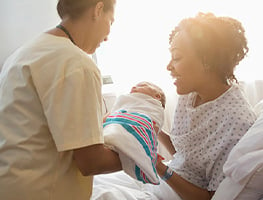For some women and their partners, planning to have a homebirth is very important. This may be because it is viewed as a natural extension of the way they live their own lives, or it just sits comfortably with their general philosophies. Many view pregnancy and birth as a normal and healthy life event and not a reason to automatically defer to medical management or hospital intervention.
Overall, there are many reasons why individual parents make the choice to have their baby at home, though some are not as obvious as others. It is fair to say that the majority of couples that consider homebirthing do so by becoming informed and educated about their options. It is generally not a decision that is taken lightly or half-heartedly.
Homebirth is a highly individual choice and may not be the right choice for every couple. However, women who choose to birth at home and who are supported and aided by a qualified midwife may not be the risk takers some people perceive them to be. They also tend to be very focused on the benefits of homebirth for both themselves and their baby.
Some women plan to have a hospital birth but unintentionally have their baby at home. An unplanned homebirth is a different situation to one which has been planned for. A rapid labour and birth can sometimes mean that a woman has her baby at home. This can present a different set of risks to a planned and carefully managed homebirth.
Why choose a homebirth?
Because it can be viewed as a less invasive, more natural way to have a baby.
A birthing woman can feel more comfortable and at ease in her own home and in her own environment.
Some people view the option to birth at home as a basic human right.
For some women, their rights to have the labour and birth they choose might not be facilitated in a hospital setting.
It may offer more options in terms of an active birth, with more freedom to move around and birth the baby in a preferred position.
It can offer a greater sense of control, autonomy and “ownership” of the labour and birth.
Homebirth advocates report that it helps women to feel empowered.
Homebirth may offer a chance to heal emotionally from previous traumatic birth experiences.
Birthing women often report that they feel their homebirth is a deeply satisfying and fulfilling experience.
Homebirth can help to involve other members of the family in the birthing experience including extended family, older children and friends.
Parents can feel there is less interruption to the emotional attachment to and bonding opportunities with their baby if they birth at home.
Partners can feel as if they are more involved, rather than just being the “support act”.
It can provide an improved “continuity of care” or “continuous care” with one or two midwives supporting a pregnant woman and her partner through the pregnancy, birth and into the early post-birth period.
Reasons not to have a homebirth
If a pregnant woman chooses not to. It may not be the right choice for her and she feels more comfortable giving birth in a hospital or clinic.
A sense and belief that giving birth in a hospital or clinic is safer and, therefore, offers a higher sense of security.
When advised not to have a homebirth by a midwife or primary healthcare provider. This is generally in relation to an unacceptably high risk of complications for either the mother or her baby.
Pregnancy complications are present such as preeclampsia, gestational diabetes, placenta praevia or the potential for obstructed labour.
A history of medical problems, which may impact on the birth.
A history of bleeding during the ante-natal period, haemorrhage or other bleeding or clotting problems.
Premature birth or multiple births
If a woman does not feel physically or emotionally safe at home. If she senses she or her baby is at risk then she is biologically determined to seek a safer option.
When the baby is not presenting cephalic, i.e. head down. Though some women still choose to have a homebirth when their baby is in the breech position, this is not ideal.
Previous caesarean section delivery or a history of uterine surgery
If a mother has had a previous complicated delivery, though this can depend on the causes and reasons why and if she has consequently had a normal vaginal delivery, i.e. VBAC (vaginal birth after caesarean)
Where you live may be an important factor to consider. Women who live in isolated or rural areas where access to emergency care is limited may not qualify for homebirth. In the case of an obstetric emergency, traffic congestion and travel time to a clinic, maternity ward or hospital can make a huge difference to a mother’s and baby’s outcomes.
Making homebirth safer
There are many factors to think about when considering having a homebirth. One of the most important is to ensure that you engage a well-trained, properly qualified midwife. South Africa has regulatory bodies responsible for registering nurses and midwives.
Birth, and parenting generally, has become a competitive sphere and many disciplines jostle for space. Some people feel that childbirth has become very expensive. This is one of the many reasons why parents that are considering a homebirth need to actively research their own options and also ensure they have fulfilled their own rights and responsibilities when it comes to making informed decisions.
It is also essential that you feel completely comfortable with your midwife and are able to build up a mutually respectful relationship that can be sustained throughout the course of your pregnancy and birth. The relationship established between a pregnant woman and her midwife is understandably very close. But at all times the midwife has the responsibility to practice in accordance with her professional boundaries and integrity.
It is important for women who are considering a homebirth, to have an uncomplicated and low-risk pregnancy with no complications. This will maximise the chances of having a problem-free birth and reduce overall risk factors.
It is not always possible or realistic to predict problems, which is why contingency plans need to be in place in case they are needed. It is important to have a good transportation and retrieval system to a maternity hospital in case of unforeseen complications.
Over the course of pregnancy, the midwife should discuss all the ethical and moral issues involved in the decision to have a homebirth. This means that when it comes to the actual birth, the labouring mother can fully focus her energies on her labour and her baby, and her mind is freed up to deal with birthing her baby.
What about the baby?
Although it may seem like stating the obvious, it is very important that the unborn baby's rights are not overlooked. Midwives and other healthcare professionals should not let the parents' desire for a homebirth overshadow the health and safety of the baby.
There may be times when a decision needs to be made to abandon plans for a homebirth and have the pregnant mother transferred to the closest maternity ward or hospital. Planning and discussions around this event needs to be done during the pregnancy, not at the point where the mother and baby are already at risk.
What does the evidence say?
There have been many studies and literature reviews examining the safety of homebirth versus hospital births. At present there is evidence for and against the safety of homebirths. Homebirth advocates are keen to point out that safety encompasses all aspects of a labouring woman's well-being, including her psychological and emotional safety.
One of the largest studies into homebirth was done in the Netherlands in 2006 and involved more than 500,000 pregnant women. Its findings reported that homebirth does not increase the risks of perinatal mortality and severe perinatal morbidity among low-risk women, as long as the maternity care system supports homebirth, there are well-trained midwives, and a thorough and reliable transportation and referral system.
However, if a couple is planning a homebirth they should be informed of the risks. Evidence shows that approximately 12-43% of those identified as low risk in pregnancy will develop a complication necessitating transfer to care in a conventional birth centre. They should also be informed that although the absolute risk may be low, planned homebirth is associated with a two to threefold increased risk of neonatal death when compared to a planned hospital birth.























